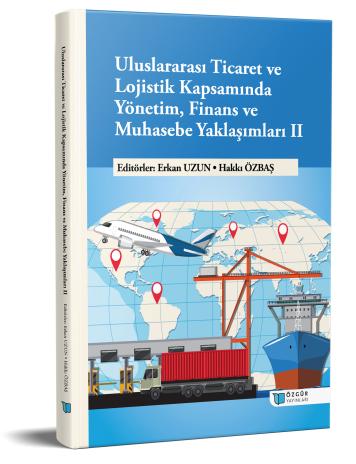
Türkiye’nin Uluslararası Ticaretinde Tarım, Sanayi ve Enerjinin Rolü: Ampirik Bir Uygulama
Şu kitabın bölümü:
Uzun,
E.
&
Özbaş,
H.
(eds.)
2025.
Uluslararası Ticaret ve Lojistik Kapsamında Yönetim, Finans ve Muhasebe Yaklaşımları II.
Özet
Bu çalışma, Türkiye’nin dış ticaret performansını belirleyen temel dinamiklerden olan tarım, sanayi ve enerji çerçevesinde incelemektedir. 1980–2024 dönemine ait yıllık veriler kullanılarak gerçekleştirilen ekonometrik analizlerde, değişkenlerin durağanlık seviyelerinin farklı olması nedeniyle Pesaran vd. (2001) tarafından geliştirilen ARDL (Autoregressive Distributed Lag) sınır testi analizi tercih edilmiştir. Analize öncelikle Phillips-Perron (PP) ve Augmented Dickey-Fuller (ADF) birim kök testleri uygulanmış, sonuç olarak LNTARIM değişkeni düzeyde durağan iken, diğer sanayi ve enerji değişkenlerinin birinci farkları alındığında durağan oldukları anlaşılmıştır. Bu analiz sonucuna göre, değişkenlerin hem I(0) hem de I(1) seviyesinde olmasının ardından ARDL analizi uygulanmıştır.
Elde edilen uzun dönemli sonuçlara göre, Türkiye’nin dış ticaretinde özellikle enerji tüketimi ve sanayi üretiminin belirleyici bir rol oynadığı görülmektedir. Enerji tüketiminde meydana gelen artış, üretim ve ihracat kapasitesini doğrudan etkileyerek dış ticareti artırmaktadır. Aynı şekilde sanayi üretiminde meydana gelen artış, Türkiye’nin küresel ekonomideki gücünü artırarak dış ticaret hacmini önemli bir şekilde artırmaktadır. Buna karşın ise tarım sektöründe meydana gelen değişiklikler dış ticarette sınırlı ama pozitif bir etki yaratmakta, özellikle tarımın destekleyici ve tamamlayıcı bir faktör olarak stratejik bir öneme sahip olduğu görülmektedir.
Çalışmanın sonuçları, Türkiye ekonomisi için bazı önemli çıkarımlar sunmaktadır. Türkiye’nin dış ticaret politikalarının belirlenmesinde enerji arz güvenliğinin sağlanması ve sanayi sektöründe rekabet gücünün artırılması önemli faktörler arasında yer almaktadır. Bununla birlikte tarım sektörü hem gıda güvenliği hem de ihracat çeşitliliği açısından önemini sürdürmekte, dolayısıyla tarıma dayalı ve teşvik edici politikalarla güçlendirilmesinin gerekliliği anlaşılmaktadır. Çalışmadan çıkan genel sonuçlara göre, Türkiye’nin dış ticaret stratejisinde enerji ve sanayi sektörlerine öncelik verilmesinin büyüme ve rekabetçilik açısından önemli olduğunu, ancak tarımın da uzun vadeli sürdürülebilirlik açısından önemsenmesi gerekliliğini göstermektedir.

